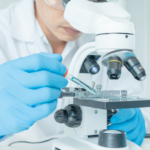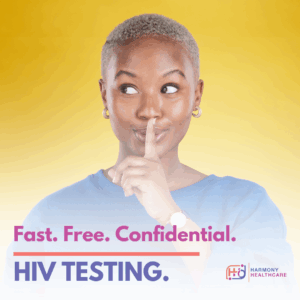
What Is Comparative Genomics and How Does It Relate To HIV?
November 20, 2024
Does a Pap Smear Also Test For HIV?
January 2, 2025If you’ve ever asked yourself “Are STI tests accurate?” the answer is yes—modern STI and HIV tests are highly reliable. The accuracy depends on factors like the type of test, when you take it, and the infection being tested for.
At Harmony Healthcare, our team follows CDC-recommended testing methods to provide trusted, confidential results so you can make informed decisions about your health.
Understanding STI Test Accuracy and the “Window Period”
Every infection has what’s known as a window period—the time between exposure and when a test can reliably detect the infection.
If you test too soon, your body may not have produced enough antibodies or viral material for detection yet, which could lead to a false non-reactive result. For example:
-
HIV antigen/antibody tests are typically accurate a few weeks after exposure.
-
Chlamydia and gonorrhea tests can usually detect infection within a couple of weeks.
-
Syphilis and hepatitis C can take longer to appear in your system.
If you’re unsure when to test, your provider can recommend the best timing or schedule a follow-up test to confirm your results.
What Can Affect STI Test Accuracy?
While STI tests are highly accurate overall, several factors can influence results:
-
Testing too early after exposure
-
The type of test (some are more sensitive than others)
-
Improper sample collection or handling
-
Certain medical conditions or treatments that interfere with results
-
At-home testing errors, if instructions aren’t followed carefully
Working with a trusted healthcare provider helps ensure your results are reliable and that you understand what they mean.
Understanding Reactive and Non-Reactive Test Results
Even though STI tests are highly accurate, it’s possible to receive results that don’t perfectly reflect your status—especially if testing is done too soon after exposure.
-
Reactive result: A reactive result means the test detected signs of an infection. However, it doesn’t always confirm a diagnosis right away. Sometimes additional testing is needed to verify the result and rule out lab errors or other factors.
-
Non-reactive result: A non-reactive result means no signs of infection were detected. If you tested shortly after a possible exposure, your provider may recommend retesting after the window period to confirm accuracy.
If you ever receive a result that surprises or confuses you, don’t panic—your healthcare provider can repeat the test or use a different method to make sure you get clear, accurate answers.
Types of STI Tests and Their Accuracy
Different tests detect infections in different ways, each with varying accuracy:
-
Antibody tests detect your immune response to infections like HIV.
-
Antigen/antibody tests look for both the virus itself and your body’s antibodies, offering earlier detection.
-
Nucleic acid tests (NATs) find genetic material from viruses like HIV or hepatitis C and are highly sensitive.
-
Urine or swab tests identify infections such as chlamydia and gonorrhea.
-
Blood tests are used for infections like syphilis and hepatitis.
Your provider can help determine which test is most accurate based on your symptoms, exposure history, and timing.
How to Get the Most Accurate Results

-
Wait until after the appropriate window period for the infection you’re testing for.
-
Follow all instructions carefully for sample collection.
-
Let your provider know about any recent medications, vaccines, or illnesses.
-
Ask about retesting if your test was taken soon after possible exposure.
-
Choose a trusted clinic that uses certified labs and evidence-based methods.
Get Accurate STI Testing in Orlando
At Harmony Healthcare, we provide confidential, high-quality STI and HIV testing designed to give you peace of mind. Our providers explain your options, help you understand your results, and guide you through any next steps—whether that’s treatment, retesting, or prevention counseling.
Contact us today to schedule your confidential STI test. You deserve accurate results and compassionate care every step of the way.
FAQ: STI Test Accuracy
How accurate are HIV tests?
Modern HIV antigen/antibody tests are more than 99% accurate when performed after the recommended window period.
Can STI tests give false results?
It’s possible, though rare. Timing, certain medical conditions, or testing errors can lead to inaccurate results.
When should I get retested?
If you tested soon after potential exposure, retesting a few weeks later can confirm your status.
Does medication or illness affect test accuracy?
Sometimes. Tell your provider about any current medications, vaccines, or recent illnesses so they can help interpret your results correctly.




